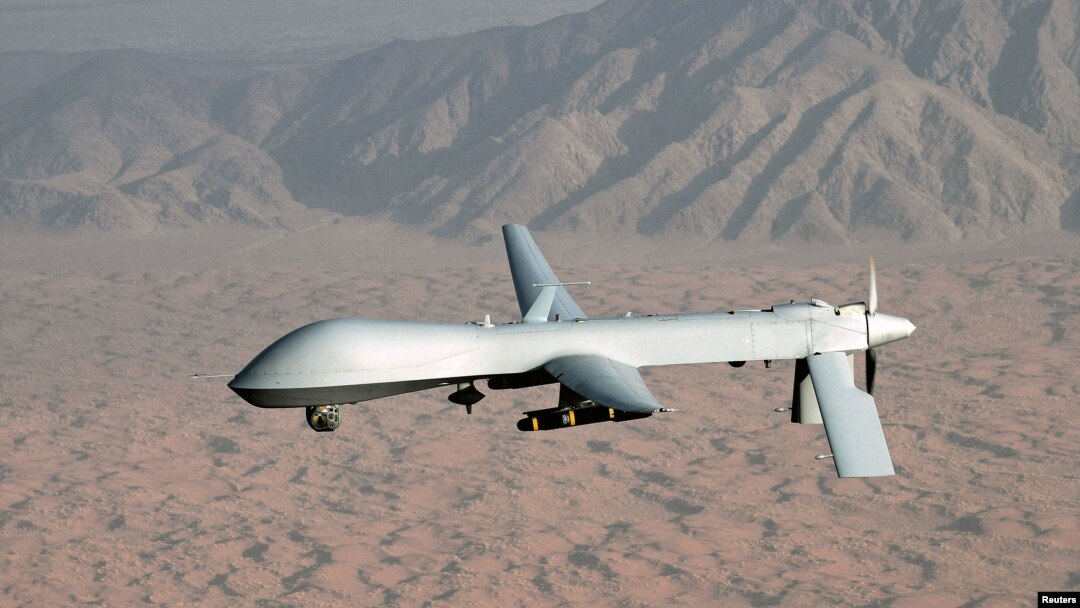The White House responded Tuesday to a major U.S. newspaper report about President Barack Obama's role in the U.S. war against al-Qaida, including decisions to place suspected terrorists on a list of people to be killed.
In a report published Tuesday, The New York Times newspaper said that since he came to office, Mr. Obama has assumed an unprecedented role in personally overseeing a "shadow war" against al-Qaida, including making final decisions whether to place individuals on a "kill list."
The newspaper cited dozens of current and former U.S. officials and Obama administration advisers who were interviewed for the report, who confirmed the existence of the list of al-Qaida suspects who can be targeted for attack by unmanned aircraft.
President Obama significantly increased the use of drones to strike terrorist targets in Pakistan. Use of the aircraft also has increased in Yemen, where the United States has directed military support to help the government fight al-Qaida-backed forces.
The New York Times report said Mr. Obama personally approves drone strikes in Yemen, Somalia and Pakistan, and decides whether to attack a terror suspect when the suspect's family is present.
White House Press Secretary Jay Carney said President Obama has made clear the United States will take whatever steps are necessary to protect Americans, but act in a manner that is "lawful and consistent" with U.S. values.
Carney was asked about a specific aspect of the report, involving what The New York Times said was a method that counts all men of military age in a strike zone as militants, unless there is intelligence to the contrary.
“This president's first priority is the protection of the United States, the protection of the citizens of this country," said Carney. "And he takes that responsibility enormously seriously, and that is why he has pursued the fight against al-Qaida in the very direct way that he has. He also believes very strongly in the need to avoid civilian casualties in the pursuit of that objective."
Carney directed reporters several times to a speech earlier this year by John Brennan, President Obama's counter-terrorism adviser, focusing U.S. efforts to avoid civilian casualties.
The president's spokesman said the United States is able to pursue al-Qaida in a way that "significantly reduces the potential for and the fact of" civilian casualties. However, Carney declined to go into the specifics of the process by which decisions are made.
Carney was also pressed about the legal justification for the existence of the "kill list" described by The New York Times, and was asked about secrecy regarding the matter.
He said Mr. Obama's "capacity" to go after members of al-Qaida was well-established in the Authorization for the Use of Military Force passed by the U.S. Congress after the 2001 al-Qaida attacks on the United States.
The United States, Carney said, has held itself to the highest possible standards as to the execution of counterterrorism operations, while using tools to avoid civilian casualties.
In a report published Tuesday, The New York Times newspaper said that since he came to office, Mr. Obama has assumed an unprecedented role in personally overseeing a "shadow war" against al-Qaida, including making final decisions whether to place individuals on a "kill list."
The newspaper cited dozens of current and former U.S. officials and Obama administration advisers who were interviewed for the report, who confirmed the existence of the list of al-Qaida suspects who can be targeted for attack by unmanned aircraft.
President Obama significantly increased the use of drones to strike terrorist targets in Pakistan. Use of the aircraft also has increased in Yemen, where the United States has directed military support to help the government fight al-Qaida-backed forces.
The New York Times report said Mr. Obama personally approves drone strikes in Yemen, Somalia and Pakistan, and decides whether to attack a terror suspect when the suspect's family is present.
White House Press Secretary Jay Carney said President Obama has made clear the United States will take whatever steps are necessary to protect Americans, but act in a manner that is "lawful and consistent" with U.S. values.
Carney was asked about a specific aspect of the report, involving what The New York Times said was a method that counts all men of military age in a strike zone as militants, unless there is intelligence to the contrary.
“This president's first priority is the protection of the United States, the protection of the citizens of this country," said Carney. "And he takes that responsibility enormously seriously, and that is why he has pursued the fight against al-Qaida in the very direct way that he has. He also believes very strongly in the need to avoid civilian casualties in the pursuit of that objective."
Carney directed reporters several times to a speech earlier this year by John Brennan, President Obama's counter-terrorism adviser, focusing U.S. efforts to avoid civilian casualties.
The president's spokesman said the United States is able to pursue al-Qaida in a way that "significantly reduces the potential for and the fact of" civilian casualties. However, Carney declined to go into the specifics of the process by which decisions are made.
Carney was also pressed about the legal justification for the existence of the "kill list" described by The New York Times, and was asked about secrecy regarding the matter.
He said Mr. Obama's "capacity" to go after members of al-Qaida was well-established in the Authorization for the Use of Military Force passed by the U.S. Congress after the 2001 al-Qaida attacks on the United States.
The United States, Carney said, has held itself to the highest possible standards as to the execution of counterterrorism operations, while using tools to avoid civilian casualties.


